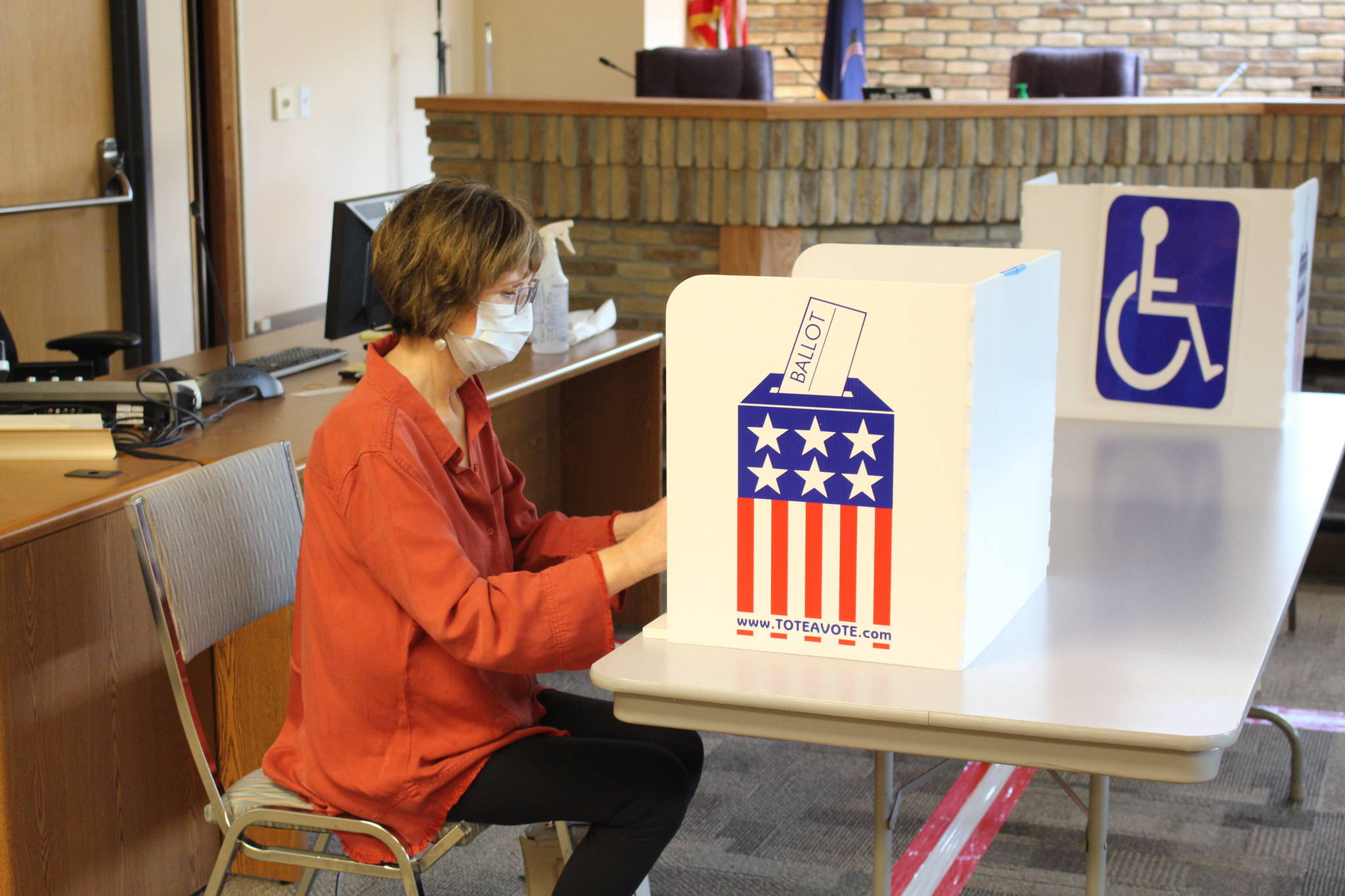The Kenai Peninsula Borough is taking steps to make elections more accessible to people with disabilities.
Following 2015’s municipal election, Richard Malley filed a complaint with the Alaska State Commission for Human Rights (ASCHR) alleging that the borough had discriminated against him when it failed to provide a voting machine that could accommodate his vision disability.
The Americans with Disabilities Act (ADA) and the Help America Vote Act of 2020 (HAVA) are among federal laws that require “full and equal opportunity” for all eligible voters to vote, which includes having an accessible voting system for people with disabilities.
ASCHR offered a conciliation agreement instead of proceeding to a public hearing, which the borough entered into in December 2018. As part of that agreement, the borough agreed to adopt a voting system that allows for private, independent voting by visually impaired citizens.
During a Tuesday meeting of the Borough Assembly’s Finance Committee, Assembly Vice President Brent Johnson said that the borough could have satisfied Malley’s complaint by adopting a hybrid election system that increased mail-in voting. That option was defeated by borough voters during the last election cycle.
Instead, the borough will proceed with a plan to purchase seven and lease 26 new voting machines and their associated equipment. Under that plan, $105,816 would be moved from the general fund to the capital project fund for the purchase of seven ADA-compliant voting machines and association shipping costs. Additionally, $148,976 would be used for the FY2021 annual lease cost of 26 additional ADA compliant systems, which includes system hardware, implementation, software licensing, support services and $20,000 in shipping costs.
Kenai Peninsula Borough Clerk Johni Blankenship said Friday that the borough will have the opportunity to purchase the leased voting systems at the end of two years, or to continue leasing them.
According to the legislation, borough code allowed Blankenship to contract specialized materials and supplies without a competitive bid process. Nine voting system providers in the United States have been able to meet testing standards and accreditation requirements that are required to receive Election Assistance Commission certification under HAVA to provide an ADA compliant voting system that can accommodate the borough’s needs since 2007.
Of those nine providers, only two responded to the borough’s request for quotes: Dominion Voting Systems Inc. and Election Systems & Software, Inc. Of the two, the borough determined that Dominion was the better choice. Dominion’s ADA compliant system is used by the State of Alaska and by municipalities and boroughs across the state, including the Kenai Peninsula Borough, which has used Dominion elections products, equipment and software since 1999. The borough’s existing equipment, however, is outdated and is not ADA compliant.
During Tuesday’s finance committee meeting, assembly member Bill Elam questioned how comfortable people are with Dominion citing recent national discourse surrounding the company. Former U.S. President Donald Trump has made several false claims about the company, whose software is used in many states. As it relates to the 2020 election, the Cybersecurity and Infrastructure Security Agency has said that there is no evidence any voting systems deletes, lost or changed votes, or was in any way compromised, according to the Associated Press.
“From a user’s perspective, I am 100% comfortable with Dominion,” Blankenship said Tuesday.
Borough IT Director Ben Hanson, who testified before the committee on Tuesday, said that in addition to Dominion being logistically more sensible for the borough, he did extensive research into claims made about the company and feels comfortable using the machines in the borough.
“I have yet to see a definitive, confirmable, corroborated piece of information about an exploit [or] a vulnerability that was disclosed,” Hanson said Tuesday. “There’s a lot of high-level technical details that are put out with no actual low-level corroborating components of information.”
Hanson said that the borough will also take additional steps to isolate the network and that, ideally, the borough would have a single server install like they do now, which would allow analog phone lines to be physically disconnected or for the modem to be turned off between elections.
“So you’re not talking about putting locks on the doors, you’re talking about not having doors?” Elam asked.
“That’s the idea,” Hanson said.
A public hearing on the ordinance is scheduled for the assembly’s April 20 meeting.
Reach reporter Ashlyn O’Hara at ashlyn.ohara@peninsulaclarion.com.

